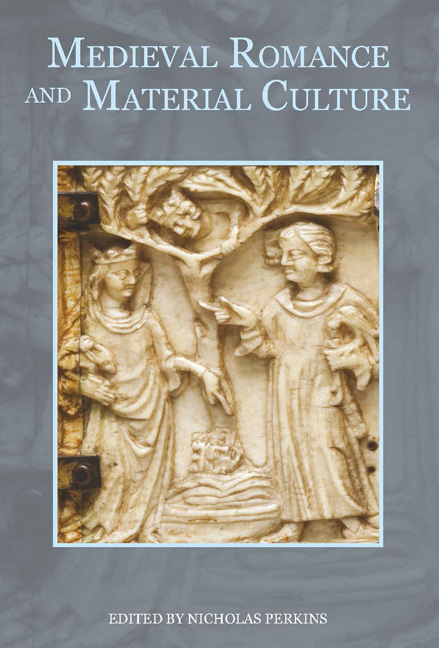Book contents
- Frontmatter
- Contents
- List of Illustrations
- List of Contributors
- Acknowledgements
- Abbreviations
- 1 Introduction: The Materiality of Medieval Romance and The Erle of Tolous
- 2 Courtly Culture and Emotional Intelligence in the Romance of Horn
- 3 Emplaced Reading, or Towards a Spatial Hermeneutic for Medieval Romance
- 4 Devotional Objects, Saracen Spaces and Miracles in Two Matter of France Romances
- 5 The Werewolf of Wicklow: Shapeshifting and Colonial Identity in the Lai de Melion
- 6 ‘Ladyes war at thare avowing’: The Female Gaze in Late-Medieval Scottish Romance
- 7 The Evolution of Cooperation in The Avowyng of Arthur
- 8 Ritual, Revenge and the Politics of Chess in Medieval Romance
- 9 Adventures in the Bob-and-Wheel Tradition: Narratives and Manuscripts
- 10 Reading King Robert of Sicily's Text(s) and Manuscript Context(s)
- 11 The Circulation of Romances from England in Late-Medieval Ireland
- 12 The Image of the Knightly Harper: Symbolism and Resonance
- 13 Carving the Folie Tristan: Ivory Caskets as Material Evidence of Textual History
- 14 Romancing the Orient: The Roman d'Alexandre and Marco Polo's Livre du grand Khan in Oxford, Bodleian Library MS Bodl. 264
- 15 The Victorian Afterlife of The Thornton Romances
- Index
5 - The Werewolf of Wicklow: Shapeshifting and Colonial Identity in the Lai de Melion
Published online by Cambridge University Press: 05 May 2015
- Frontmatter
- Contents
- List of Illustrations
- List of Contributors
- Acknowledgements
- Abbreviations
- 1 Introduction: The Materiality of Medieval Romance and The Erle of Tolous
- 2 Courtly Culture and Emotional Intelligence in the Romance of Horn
- 3 Emplaced Reading, or Towards a Spatial Hermeneutic for Medieval Romance
- 4 Devotional Objects, Saracen Spaces and Miracles in Two Matter of France Romances
- 5 The Werewolf of Wicklow: Shapeshifting and Colonial Identity in the Lai de Melion
- 6 ‘Ladyes war at thare avowing’: The Female Gaze in Late-Medieval Scottish Romance
- 7 The Evolution of Cooperation in The Avowyng of Arthur
- 8 Ritual, Revenge and the Politics of Chess in Medieval Romance
- 9 Adventures in the Bob-and-Wheel Tradition: Narratives and Manuscripts
- 10 Reading King Robert of Sicily's Text(s) and Manuscript Context(s)
- 11 The Circulation of Romances from England in Late-Medieval Ireland
- 12 The Image of the Knightly Harper: Symbolism and Resonance
- 13 Carving the Folie Tristan: Ivory Caskets as Material Evidence of Textual History
- 14 Romancing the Orient: The Roman d'Alexandre and Marco Polo's Livre du grand Khan in Oxford, Bodleian Library MS Bodl. 264
- 15 The Victorian Afterlife of The Thornton Romances
- Index
Summary
This essay is an analysis of the implied cultural geography of the Lai de Melion, an anonymous Old French narrative lay now extant only in a thirteenth-century manuscript in the Bibliothèque d'Arsenal in Paris. What is argued here is that the Irish landscape in which Melion's adventures are set is actually much more solidly and precisely imagined than is generally assumed; and that the complexity of the particular political and ethnic identities associated with this landscape is visibly figured in the bodily metamorphoses of the werewolf who is the Lai's eponymous protagonist.
Initially at least, this is not a text that would seem to encourage such an approach. In its first few lines, the action is located (both temporally and geo - graphically) only in terms that are conspicuously vague. The poet refers simply to ‘the time when King Arthur reigned’ (‘Al tans que rois Artus regnoit’ (1)); and describes him blandly as ‘he who conquered lands’ (‘cil ki les terres conqueroit’ (2)), without even saying what those lands were. Melion himself also seems like an appropriately conventional inhabitant for so colourlessly generic a setting. He is introduced as a knight who is both ‘courtly and noble’ (‘cortois et prous’ (7)) and universally popular (‘amer se faisoit a tos’ (8)). Then one day the knights in Arthur's household decide to hold some sort of chivalric competition in which each of them chooses to make a vow of some kind. The vow that Melion decides to make is a particularly extravagant one: he swears not to love any woman who has ever before loved any another man, or even ever before spoken of any other man (13–22). Not surprisingly, this rather presumptuous undertaking fails to win him any approval from the women of King Arthur's court. Indeed, they are said to hate him for it (‘Molt durement l'en enhaïrent’ (28)), with the result that Melion becomes downcast (37–42), and the king attempts to console him for this by giving him a fine estate by the sea (‘sor cele mer’, (55)).
- Type
- Chapter
- Information
- Medieval Romance and Material Culture , pp. 75 - 90Publisher: Boydell & BrewerPrint publication year: 2015



